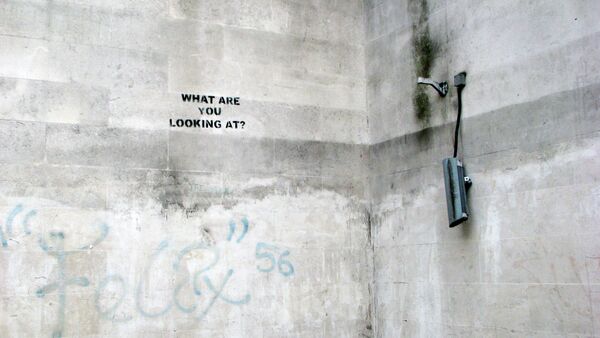As more public spaces became privately owned, CCTV cameras were used to guard properties, not to keep citizens safe.
In 1991, just ten cities in Britain used cameras to monitor street activity. But in 1993, the grainy CCTV image of Jamie Bulger showed the toddler being led away from a shopping mall on Merseyside by his two ten-year-old killers. The CCTV footage shown night after night on the national news, led to ‘the subsequent moral panic about youth crime' in Britain, according to a report by Surveillance and Society.
The BSIA estimates there is 1 CCTV camera for every 14 people in Britain. Secure with Clarion.. http://t.co/Xx09hO9q9c #CCTV #FACT #Security
— Clarion Security (@clarionuk) January 21, 2015
The spread of private space in the early 90s meant John Major's government seized upon the use of CCTV to fight crime, it was cheap and intended to make people feel more safe; but according to Anna Minton, author of Fortress Britain and Ground Control, surveillance expert and visiting professor at the University of East London, it makes people feel more scared and fear crime even more.
CCTV Switched Off by Cash Strapped Councils
In the early 2000s, it was a relatively cheap solution for addressing crime, says Minton, "politicians were able to tell the public that they were listening to them and actively combating crime by replicating eyes on the street with closed circuit television. But the police don't think it's an effective crime fighting tool and with budget cuts to local councils, CCTV isn't much of a priority".
The problem, Minton says, is that the cameras are still there with no film and no one monitoring them.
admit it, britain, these aggro spikes do nothing to protect CCTV cameras—you just wanted them to look more ferocious pic.twitter.com/7sxOUhzn1G
— cszabla (@cszabla) July 7, 2014
"This makes for a sterile and alienating environment. People don't know that they're switched off. If councils removed them it would be a positive step forward. There are hardly any CCTV cameras in Scandinavian countries and the fear of crime there is much lower".
4 million CCTV cameras in UK — more than rest of Europe Combined! + research now suggests not even that effective! http://t.co/89n6m35dYm
— Richard Reason (@djrichreason) January 21, 2015
CCTV is counterproductive says Minton:
"It makes places more fearful and paranoid. Security is counterintuitive — if the cameras aren't on, they should be removed from the city, and it's time we started removing them from the environments".
Anna Minton is also the author of ‘Why are fear and distrust spiralling in 21st century Britain?', a report published by The Joseph Rowntree Foundation in 2007.
Eight years ago, Minton suggested that the shooting of Rhys Jones and the kidnapping and killing of Jamie Bulger, both high profile cases in Liverpool, contributed "and fit in with the existing perception that Liverpool is a high crime area…Except Liverpool is not a high crime city".
Fear of Crime Not Crime Itself
It's a classic example of a place where ‘fear of crime rather than crime itself' is the problem, according to the report. In 2007, the Index for Multiple Deprivation ranked Liverpool as the most deprived city in England.
"One of the most segregated and security conscious places in the country, with one of the largest CCTV networks in Britain", suggests Minton.
According to the report ‘Why are fear and distrust spiraling in 21st century Britain?', Liverpool's main shopping centre is under the tight control of private officers and security guards; and all shoppers' movements are monitored. In contrast, in the outer lying parts of Liverpool, drones are used to patrol the deprived parts of the city.
However, the drop in CCTV use doesn't mean people in Britain aren't being monitored any less; it's just become more targeted.
Drones for Deprived Britain
More military developed technology is migrating to the streets of Britain. Around six police forces in the UK are using surveillance drones with thermal imaging cameras to monitor large crowds — and in some cases, poor and deprived areas in cities.
In Liverpool drones fly over deprived areas of the city in poor areas where crime is higher. Anna Minton told Sputnik UK:
"Areas feel militarised and begin to resemble conflict zones with cameras covered in barbed wire. It's totally alienating. It's not just CCTV; it's high fences and barbed wire. I used to see that sort of thing in Northern Ireland".
Flying CCTV Camera to Catch a Car Thief
In 2010, The Liverpool Echo reported that Merseyside Police made their first ever arrest using a flying drone to catch a car thief. The unmanned aerial vehicle (UAV) acts as flying CCTV with a thermal imaging camera. The force was the first in the UK to trial drones as far back as 2007 'and since then has been used to assist in search and rescue operations, search warrants and to crack down on anti-social behaviour'.
There's a whole generation that is being brought up with this level of security, which is addictive, says Minton: "The more you have, the more you think you need. I'm really worried about the use of surveillance in schools. It's all part of the spread of security".
Despite the demise of CCTV cameras, smart phones, payment cards on transport systems, body cameras worn by police officers and drones mean people are still heavily under surveillance.




